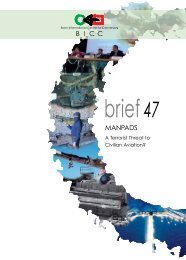egypt-final-presidential-elections-2012
egypt-final-presidential-elections-2012
egypt-final-presidential-elections-2012
You also want an ePaper? Increase the reach of your titles
YUMPU automatically turns print PDFs into web optimized ePapers that Google loves.
The Carter Center<br />
Participation of Women<br />
Women were underrepresented<br />
throughout<br />
the Egyptian<br />
<strong>presidential</strong> electoral process.<br />
First and foremost, none of the<br />
23 candidates who attempted<br />
to register as <strong>presidential</strong> candidates<br />
and, consequently, none<br />
of the 13 candidates who made<br />
the <strong>final</strong> ballot, were women. 131<br />
There was also a noticeable lack<br />
of participation by women during<br />
the campaign phase. At several<br />
campaign rallies witnessed<br />
by The Carter Center, there<br />
were no women at all present.<br />
On a more positive note, there<br />
was a significant percentage of<br />
female candidate agents present<br />
in polling stations during voting,<br />
approaching 40 percent of agents for the second<br />
round of voting.<br />
Egypt should take further steps to prevent discrimination<br />
against women, as required by its international<br />
obligations. 132 PEC members, all senior judges,<br />
were exclusively men due to the ex officio nature of<br />
appointments and the overwhelming prevalence of<br />
men among senior Egyptian judges. Only one woman<br />
judge was a member of the General Secretariat that<br />
served the election management body. According<br />
to the PEC’s secretary-general, the PEC prioritized<br />
allocating Egypt’s women judges and prosecutors to<br />
polling stations before allocating the male judges<br />
and prosecutors so as to achieve maximum female<br />
participation. 133 However, women judges are a recent<br />
phenomenon in Egypt, and they tend to be both a<br />
small percentage of and junior members of the judiciary.<br />
The Carter Center hopes women will become<br />
a greater, and more senior, component of Egypt’s<br />
Program manager Avery Davis-Roberts and co-leader Abdel Karim al-Eryani fill out a<br />
checklist as a woman casts her vote during the runoff.<br />
judiciary in years to come. Women should also play a<br />
greater role in a future EMB, in which senior appointments<br />
are not ex officio in nature.<br />
There are many (mostly rural) women who remain<br />
disenfranchised because they are not included in<br />
the national identity database and, as a result, are<br />
prevented from being registered to vote. In some<br />
parts of Egypt, cultural and historical factors, the<br />
availability of birth certificates, and awareness of<br />
eligibility for or access to the civil registration process<br />
131 Broadcaster and activist Bothaina Kamel did attempt to be nominated<br />
to run for the <strong>presidential</strong> <strong>elections</strong> but failed to collect the required<br />
amount of signatures.<br />
132 U.N., Convention on the Elimination of All Forms of Discrimination<br />
Against Women, Article 3; UNHRC, General Comment No. 28, para. 3.<br />
133 The PEC reported that there were approximately 1,200 women judges<br />
and prosecutors available. According to the PEC, the total number of<br />
judges and prosecutors in Egypt is approximately 15,000.<br />
Maurice Chammah<br />
45



